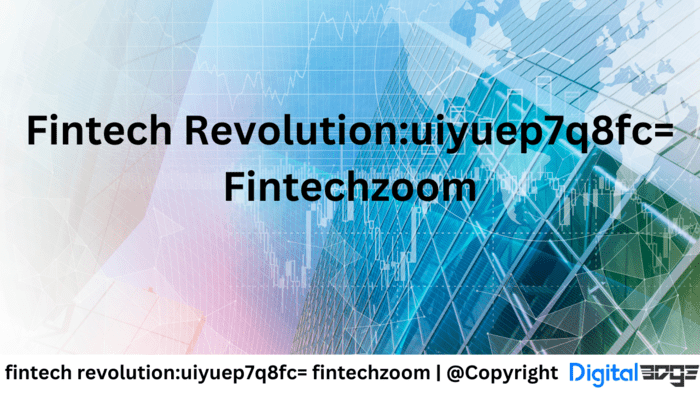The financial realm is experiencing a profound revolution propelled by the rise of financial technology, known as fintech. Fintech is fundamentally altering how we handle finances, disrupting conventional banking systems, and significantly impacting the financial sector.
A potent cocktail of technologies like mobile payments, blockchain, AI, and data analysis propels fintech to the forefront of financial innovation.
This disruptive force is reshaping the financial landscape, making it more efficient, accessible, and brimming with new opportunities for everyone involved.
Fintech: Embracing Digital Innovation
Fintech utilizes technology to enhance the efficiency, accessibility, and user experience of financial services. This includes digital payments, lending platforms, insurtech, and personal finance management tools.
Through advanced technologies, fintech innovates and transforms traditional financial practices, providing consumers with faster, more cost-effective, and convenient alternatives to conventional banking services.
Advantages of Fintech
The emergence of fintech offers numerous benefits to both businesses and consumers. Let’s explore some of the key advantages that fintech delivers:
1. Increased Efficiency and Speed
Fintech solutions streamline transactions, simplifying formerly complex processes. Mobile payments and digital wallets enable instant transactions without physical cash or cards, saving time and enhancing user convenience.
2. Enhanced Access to Financial Services
Fintech plays a pivotal role in expanding financial inclusion through technological innovations. Mobile banking apps and digital platforms extend banking services to underserved populations in remote areas, facilitating easier financial management and transactions.
3. Cost Savings for Businesses and Consumers
Fintech innovations can potentially significantly reduce costs for both businesses and consumers. By automating tasks and eliminating the overhead of physical infrastructure, fintech companies provide financial services more affordably compared to traditional banks.
This cost efficiency translates into lower consumer fees and more accessible financial products.
4. Improved Customer Experience
Fintech firms prioritize customer satisfaction by offering intuitive interfaces, user-friendly applications, and personalized services.
Utilizing advanced data analytics and artificial intelligence, fintech providers tailor financial solutions to match individual customer preferences and behaviors, fostering loyalty and enhancing overall satisfaction.
5. Innovation and Technological Advancement
Fintech is in charge of advancing technology within the financial sector. Through continuous innovation and integrating emerging technologies, such as blockchain and robo-advisors, fintech is reshaping traditional financial services and paving the way for a future driven by technological advancements.
Impact of Fintech on Banking and Financial Services
Fintech’s impact on the banking and financial services sector is substantial and far-reaching.
Let’s explore how fintech is transforming various aspects of finance:
1. Digital Banking: Rise of Neo-Banks
Traditional banks are being challenged by fintech’s introduction of neo-banks, also known as challenger banks. These digital-native institutions forego physical branches in favor of user-friendly apps and websites.
They simplify account opening, enable effortless money transfers, and empower users with effective budgeting tools. By focusing on customer convenience, neo-banks are attracting a growing clientele and prompting traditional banks to enhance their digital offerings.
2. Payments and Transfers: Evolution of Mobile Payments
Fintech has fueled the rise of mobile payments, enabling secure and convenient transactions via mobile wallets and payment apps.
This technology has revolutionized everyday transactions, from scanning QR codes to tapping contactless terminals and transferring funds electronically. Fintech companies lead this evolution, continually improving mobile payment solutions for enhanced speed, usability, and security.
3. Lending and Borrowing: Growth of Peer-to-Peer Lending
Fintech’s innovation is reshaping lending through peer-to-peer (P2P) platforms, which connect borrowers directly with lenders online, bypassing traditional banking channels.
This model accelerates loan accessibility, potentially offering lower interest rates and utilizing advanced data analytics to assess borrower creditworthiness. P2P lending expands credit opportunities, particularly benefiting underserved communities.
4. Investment and Wealth Management: Robo-Advisors and Automated Investing
Fintech has democratized investment and wealth management with robo-advisors, which leverage algorithms and AI to provide automated investment advice and manage portfolios.
These platforms offer tailored investment strategies aligned with individual financial goals, risk tolerance, and time horizons.
Robo-advisors challenge traditional financial advisors and investment firms by delivering cost-effective and convenient solutions.
5. Insurance Technology (Insurtech): Digital Transformation of Insurance Services
Insurtech is revolutionizing the insurance industry through digitalization, automation, and personalization. Data analysis and AI enable insurtech companies to tailor insurance plans based on individual risk profiles, enhancing customization and efficiency.
Automated processes streamline claims handling, reducing paperwork and enhancing customer satisfaction. Insurtech also introduces innovative options like usage-based insurance, using data from connected devices to adjust coverage and pricing for policyholders.
Fintech presents significant opportunities, challenges, and considerations for businesses, regulators, and consumers. Let’s explore some of the primary challenges faced during this fintech era:
1. Regulatory Compliance and Security
As fintech evolves, regulators must adapt frameworks to ensure consumer protection, data privacy, and financial stability. Fintech companies encounter the complexities of navigating regulatory environments, including compliance with anti-money laundering (AML) and know-your-customer (KYC) regulations.
Robust cybersecurity measures are essential to safeguard sensitive financial information from breaches.
2. Financial Inclusion and Accessibility
Fintech’s potential to improve financial inclusion necessitates addressing digital access and literacy gaps among underserved populations. Bridging the digital divide through education and support ensures that all socioeconomic groups can benefit from fintech innovations.
3. Trust and Consumer Adoption
Establishing consumer trust is crucial for widespread fintech adoption. Transparency in operations, robust security protocols, and clear communication about how fintech solutions work are essential.
Educating consumers about the benefits and risks of fintech helps mitigate skepticism and encourages adoption.
4. Ethical Use of Data and Artificial Intelligence
Fintech’s reliance on data and AI requires ethical considerations to protect privacy, ensure consent, and promote fair algorithmic practices.
Upholding ethical standards in innovation helps prevent biases and discrimination, fostering sustainable growth and societal trust in fintech advancements.
Fintech’s Bright Future of Innovation
Continuous innovation and technological advancements promise a vibrant future for fintech. Here are the key trends and developments to watch:
1. Open Banking and Collaborative Efforts
Open banking, enabled by APIs, empowers third-party developers to innovate using financial data from banks and institutions. Collaboration between traditional banks and fintech startups is increasingly common, driving innovation and customer-centric solutions.
2. Blockchain Technology and Cryptocurrencies
Blockchain technology holds immense promise for reshaping the financial world. It strengthens transaction security, automates agreements through smart contracts, and paves the way for a new era of decentralized finance (DeFi).
Cryptocurrencies built on blockchain are gaining momentum and disrupting traditional payment systems. The confluence of cryptocurrencies and central bank digital currencies (CBDCs) will unquestionably redefine the future of financial transactions.
3. Artificial Intelligence and Machine Learning
Artificial intelligence (AI) and machine learning play crucial roles in fintech, facilitating accurate risk assessment, fraud detection, personalized recommendations, and improved customer service.
AI-driven chatbots and virtual assistants continue to evolve, providing efficient and responsive customer support.
4. Sustainable Finance and Impact Investing
Fintech platforms drive sustainable finance and impact investing amid increasing societal and environmental concerns.
These platforms enable investments in environmentally friendly projects, renewable energy initiatives, and social enterprises, aligning financial objectives with positive social and environmental outcomes.
Conclusion
The fintech revolution is reshaping the future of finance, revolutionizing how we handle banking, investments, and financial services. Similarly, FintechAsia Sombras stands to be the fintech revolution in Asia-Pacific. Fintech brings substantial benefits such as enhanced efficiency, broader accessibility, cost reductions, improved customer experiences, and ongoing innovation.
However, careful attention is required for regulatory compliance, security issues, financial inclusivity, and ethical data handling to ensure the fintech sector’s long-term success and sustainability.
Embracing innovation and staying abreast of emerging trends will be essential in navigating the rapidly evolving financial landscape and seizing fintech’s opportunities.
Looking ahead, the future of finance is closely intertwined with the promising advancements continually introduced by fintech.
SmartDev has the expertise and proven industry experience you need if you’re considering a fintech initiative. Contact us today for a complimentary consultation on your project, and let’s forge ahead toward a bright future for finance together.


